25 Companion Plants For Sweet Potatoes To Help Them THRIVE!
Are you looking for good companion plants for sweet potatoes to plant in your garden?
Planting the right companion plants mean that the plant in question will encourage faster growth, you will repel insect pests and attract beneficial insects, will improve soil nutrients, and best of all, improve the taste!
You might not know this about me, but I LOVE sweet potatoes!
My favorite way to eat them is to cut them up into thick coins, drizzle them with olive oil, toss them until evenly coated with the oil, then sprinkle them with salt.
Then, spread them out on a baking sheet and sprinkle with a few generous pinches of salt before baking in a hot oven for half an hour or so, flipping over halfway through.
YUM! Perfect alongside a green salad and some baked chicken.
Because they are one of my favorite vegetables, I want to give growing them a try in our warm, Malaysian climate, though sweet potatoes are not frost-sensitive and can be grown in a wide range of climates, they do best when grown in warmer weather.
I also have a deep desire to be good at growing sweet potatoes, hence my journey into learning about companion planting. Using companion plants for sweet potatoes will provide ground cover and shade, amongst other things.
Sweet potatoes are a relatively low-maintenance crop, but they do have a few specific needs. Read on to find out what they are, and what grows well with sweet potatoes and you’ll be baking them in your oven in what feels like no time!
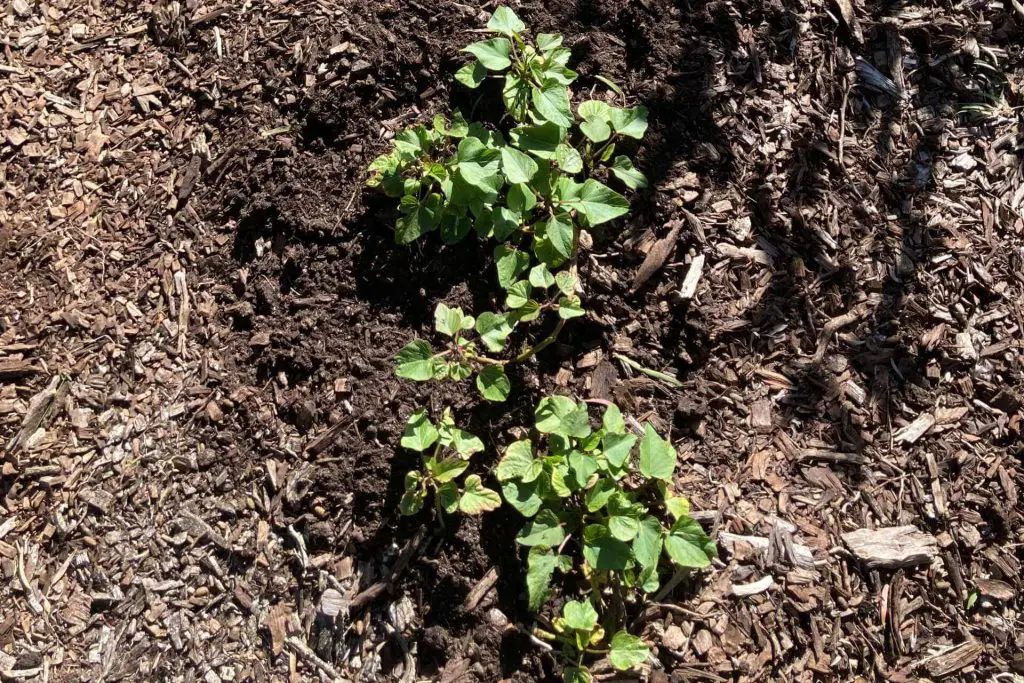
My Top Sweet Potato Companion Plants
1. Parsnips
2. Beets
3. Bush Beans
4. Pole Beans
5. Potatoes
6. Thyme
7. Oregano
8. Dill
9. Summer Savory
10. Spinach
11. Garlic
12. Turnips
13. Peas
14. Basil
15. Sweet Alyssum
16. Yarrow
17. Nasturtium
18. Marigold
19. Onion
20. Chives
21. Radishes
22. Horseradish
23. Corn
24.. Borage
25. Lettuce
Affiliate Link Disclosure
Some of the links on here are affiliate links and I may earn if you click on them, AT NO EXTRA cost to you. I hope you find the information here useful! Thanks
Related Posts
- How Many Sweet Potatoes Per Plant
- How Long Does It Take To Grow Potatoes [Harvest The RIGHT Way]
- 15 Companion Plants For Asparagus To Help It THRIVE! [2023]
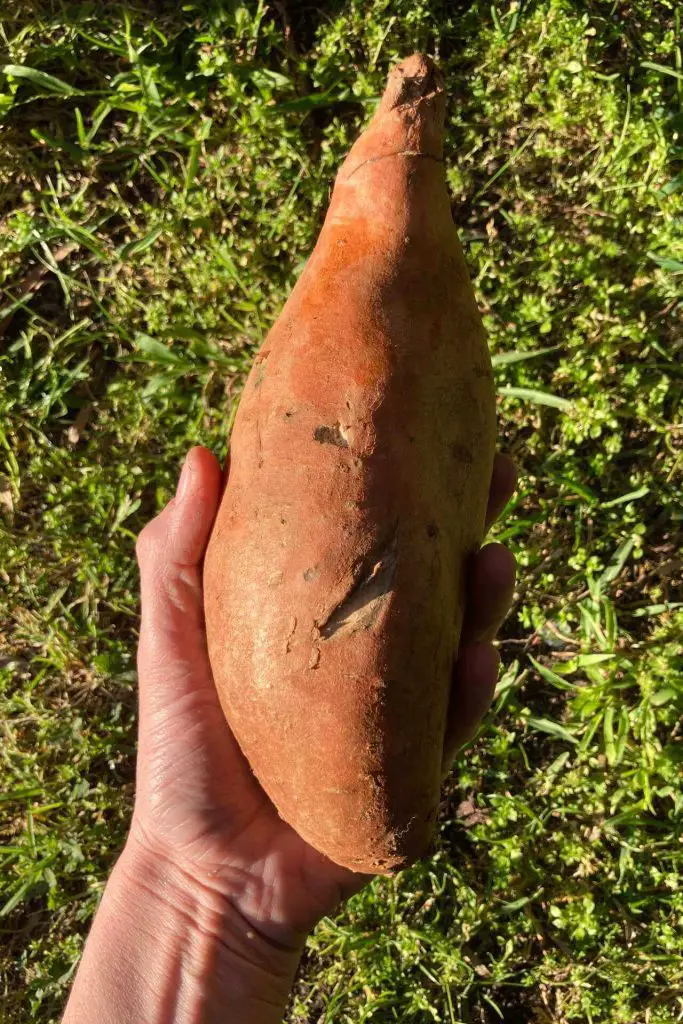
25 Sweet Potato Vine Companion Plants
1. Parsnips
- Benefits: Will repel pests, especially flea beetles.
- Spacing Requirements: 6 inches apart in rows 12 inches apart
- Time From Seed To Harvest: 120-180 days
- Popular Varieties: Harris Model, Hollow Crown, All American
2. Beets
- Benefits: Will repel pests, especially flea beetles.
- Spacing Requirements: 1-2 inches apart in rows that are 12-18 inches apart
- Time From Seed To Harvest: 55-70 days
- Popular Varieties: Detroit Dark Red, Early Wonder, Golden Detroit, Chioggia
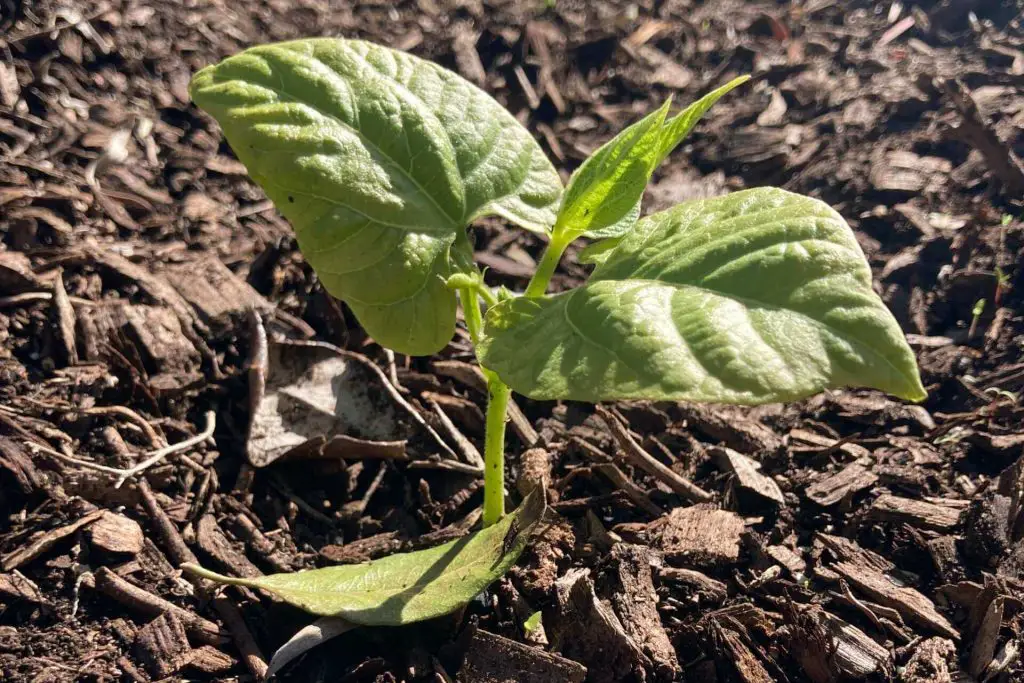
3. Bush Beans
- Benefits: Will fix nitrogen in the soil and increase your sweet potato yield.
- Spacing Requirements: 2 inches apart in rows 18 inches apart
- Time From Seed To Harvest: About 40-60 days after planting
- Popular Varieties: Blue Lake, Slenderette, Provider, Contender
4. Pole Beans
- Benefits: Will fix nitrogen in the soil. Also will offer shade protection for your sweet potato from the hot sun.
- Spacing Requirements: 4-6 inches apart in rows 30-36 inches apart
- Time From Seed To Harvest: 70-90 days
- Popular Varieties: Kentucky Wonder, Rattlesnake
5. Potatoes
- Benefits: Can attract insects to themselves, which will in turn leave your sweet potato alone.
- Spacing Requirements: Place each seed potato with eyes pointing up, 12-15 inches apart, with rows 3 feet apart
- Time From Seed To Harvest: 12-20 weeks
- Popular Varieties: Yukon Gold, Russet, Southern Red, Fingerling, Kennebac
6. Thyme
- Benefits: This will improve the flavor of your sweet potato while attracting beneficial insects and repelling flies, thrips, spider mites, and hornworms.
- Spacing Requirements: 12-24 inches apart, depending on the variety
- Time From Seed To Harvest: Thyme grows very slowly, and germination from seed alone can take at least 28 days.
You can begin to harvest thyme when they start to reach a height of 6-8 inches, which will take at least 70 days after planting.
- Popular Varieties: Thyme Seeds
7. Oregano
- Benefits: Acts as a ground cover which will reduce the number of weeds making it an excellent companion planting for sweet potatoes.
- Spacing Requirements: 8-10 inches apart
- Time From Seed To Harvest: Anytime from about 70 days, but wait until the plant is at least 5-6 inches tall to ensure it is robust enough to handle being harvested
8. Dill
- Benefits: Attracts pollinators that help sweet potatoes grow
- Spacing Requirements: 10-12 inches apart
- Time From Seed To Harvest: 90 days
- Popular Varieties: Mammoth Long Island, Bouquet, Fernleaf
9. Summer Savory
- Benefits: Attracts bees and other pollinators to the garden
- Spacing Requirements: 8 inches apart
- Time From Seed To Harvest: Cut for fresh use once mature
- Popular Varieties: Summer Savory
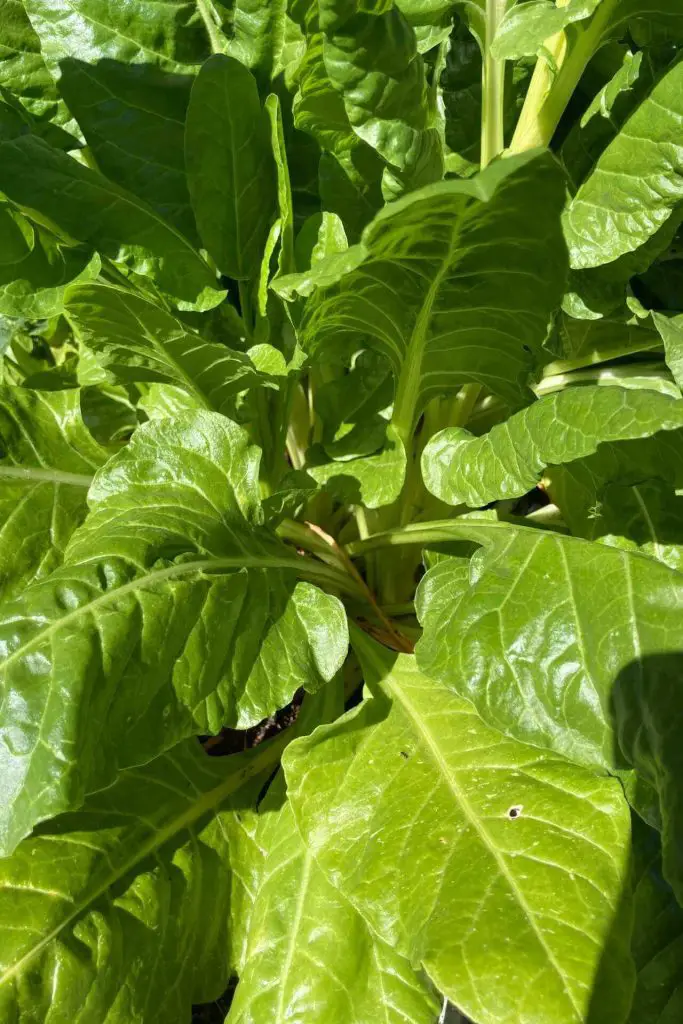
10. Spinach
- Benefits: Acts as a ground cover which will reduce the number of weeds, and stop the soil from drying out.
They are also quick to grow and harvest, meaning you can harvest them before the sweet potatoes, giving the sweet potatoes plenty of room to grow.
- Spacing Requirements: 3-6 inches apart
- Time From Seed To Harvest: After 6 weeks of cool weather you should be able to harvest your spinach, just remember to only pick the outside leaves and don’t pick more than a third of the plant, so it can re-grow more leaves and you can get multiple harvests in one season
- Popular Varieties: Giant Winter, Bloomsdale, Bloomsdale Long Standing, Viroflay
11. Garlic
- Benefits: Will keep away pests, making it an excellent companion planting with sweet potatoes.
- Spacing Requirements: 6 inches apart
- Time From Seed To Harvest: Garlic is a long maturing crop and takes 8-9 months to grow from plantable cloves to harvest.
- Popular Varieties: California, Siberian Hardneck, Elephant (a personal favorite of mine!) Chesnok Red, Dichondra Black
12. Turnips
- Benefits: Take up minimal space and repels pests
- Spacing Requirements: 1-2 inches apart in rows 18-30 inches apart
- Time From Seed To Harvest: 40-55 days
- Popular Varieties: Purple Top, Snowball, Seven Top
13. Peas
- Benefits: Will fix nitrogen in the soil.
- Spacing Requirements: 2-3 inches apart in rows 18 inches apart
- Time From Seed To Harvest: Approximately 10-14 weeks after planting, depending on the variety.
- Popular Varieties: Sugar Snap, Green Arrow, Dwarf Sugar Grey, Purple Hull
14. Basil
- Benefits: Attracts good insects and repels aphids. The smell of the basil will also camouflage your sweet potato from pests.
- Spacing Requirements: 12-16 inches apart
- Time From Seed To Harvest: 21-28 days
15. Sweet Alyssum
- Benefits: Acts as a ground cover that reduces the number of weeds, also stops soil erosion, and attracts beneficial insects.
- Spacing Requirements: 3-4 inches apart
- Time From Seed To Harvest: These take about 9-10 weeks to flower from the time you planted the seeds.
- Popular Varieties: Royal Carpet, Carpet Of Snow, Oriental Nights
16. Yarrow
- Benefits: Attracts pollinators, as well as predatory insects such as wasps, ladybugs, lacewings, and spiders, which will naturally keep the bad insects under control.
- Spacing Requirements: 12-24 inches
- Time From Seed To Harvest: 120 days for the plant to bloom
- Popular Varieties: Gold, White, Red, Summer Pastels
17. Nasturtium
- Benefits: Good as a marker plant in between rows and also acts as a trap plant – drawing bugs away from the sweet potato and onto the nasturtium instead! What a good sweet potato companion!
- Spacing Requirements: 3 inches apart
- Time From Seed To Harvest: These flowers are some of the quickest growing plants, with flowers being produced around 6 weeks after planting, between 35-50 days after germination.
- Popular Varieties: Dwarf Jewel Mix, Jewel Mix, Black Velvet, Peach Melba, Cherry Rose
18. Marigold
- Benefits: Repels nematodes that can damage root systems as well as whiteflies, aphids, and other pests.
- Spacing Requirements: 10-12 inches apart
- Time From Seed To Harvest: Depending on the variety, marigold plants will flower anywhere between 50-100 days after planting the seeds.
- Popular Varieties: Petite Mix, Crackerjack Mix, French
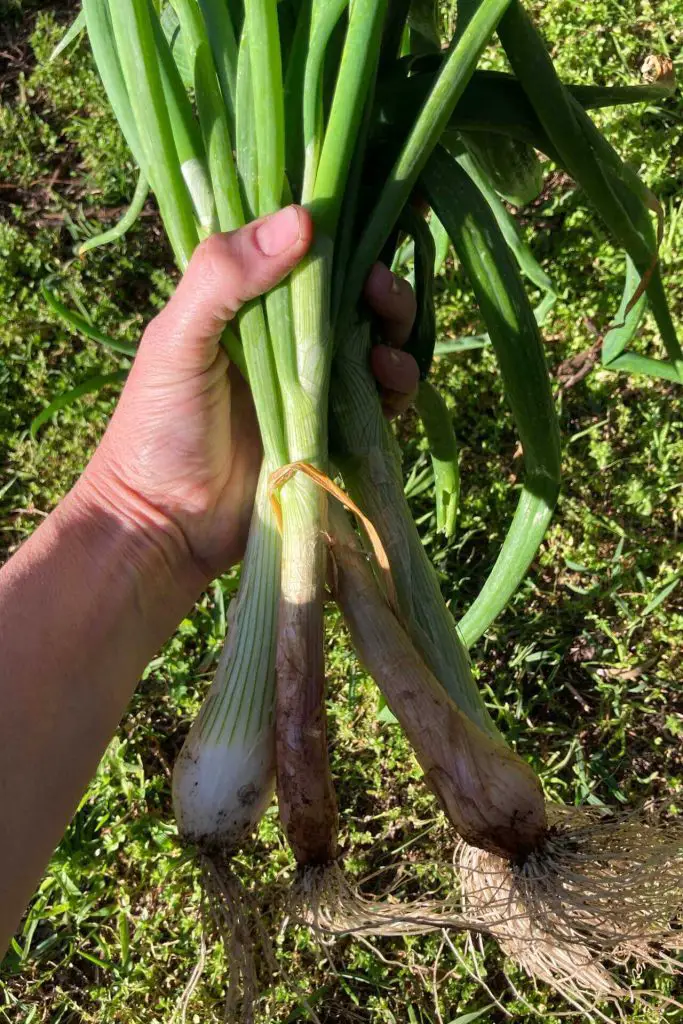
19. Onion
- Benefits: Keep away bugs, also handy markers and dividers.
- Spacing Requirements: 2 inches apart for smaller bulbs, 4 inches apart for bigger bulbs
- Time From Seed To Harvest: Onions are a very long crop, taking 100-120 days to grow from seed to a full bulb
- Popular Varieties: Texas Grano, Walla Walla, Yellow Sweet Spanish, Red Creole, Gladstone White, Utah Yellow Sweet
20. Chives
- Benefits: Keeps away pests.
- Spacing Requirements: 6 inches apart
- Time From Seed To Harvest: Any time 60 days after sowing seed
- Popular Varieties: Garden Chives, Garlic Chives
21. Radishes
- Benefits: Radishes are an excellent companion plant for several reasons. They mature very quickly, meaning you can harvest them early enough to leave more room for the sweet potato to grow.
They also loosen the soil, which helps with water absorption, and they also attract aphids, which in turn attract ladybugs and lacewings, who will eat the aphids instead of your sweet potato!
- Spacing Requirements: 2-3 inches apart
- Time From Seed To Harvest: 30-50 days
- Popular Varieties: Champion, Cherry Belle, Early Scarlet Globe, French Breakfast Radish, Watermelon Radish, Daikon
22. Horseradish
- Benefits: Will repel pests, especially flea beetles.
- Spacing Requirements: 12-18 inches
- Time From Seed To Harvest: One year
- Popular Varieties: Horseradish Roots
23. Corn
- Benefits: If you interplant plant corn in a large bed of sweet potato, the corn will provide the dappled shade that will help sweet potato thrive
- Spacing Requirements: 6-12 inches
- Time From Seed To Harvest: 120 days
- Popular Varieties: Bantam, Peaches and Cream, Blue Hopi, Silver Queen, Golden Jubilee
24. Borage
- Benefits: Its aroma will ward off the destructive sweet potato weevil.
- Spacing Requirements: 18-24 inches apart
- Time From Seed To Harvest: 60-70 days
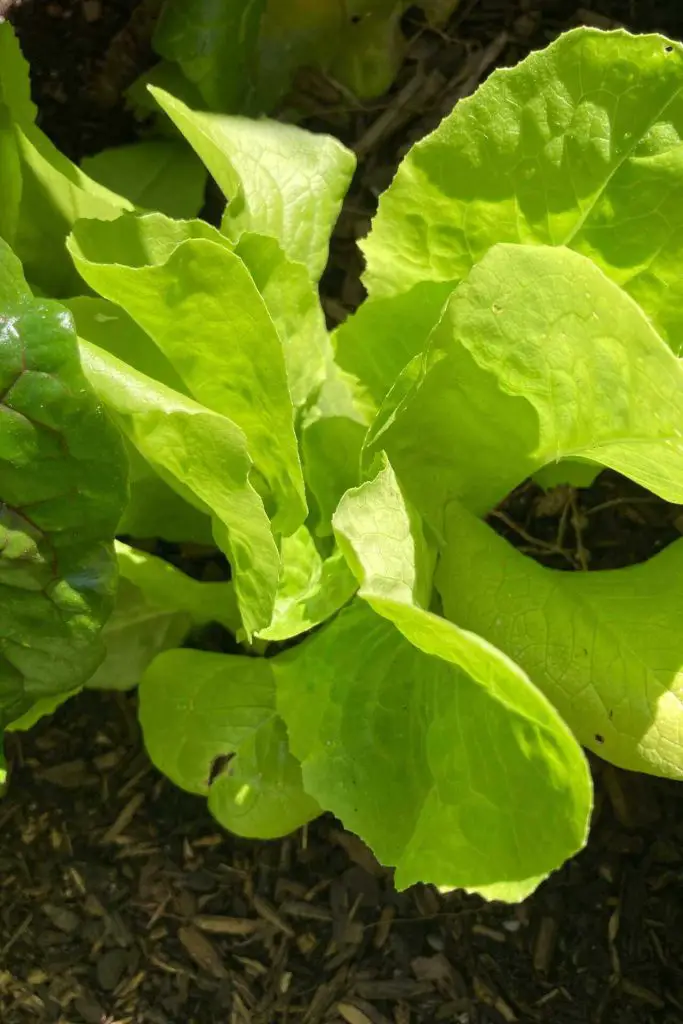
25. Lettuce
- Benefits: Has a shallow root system, so won’t compete for space with your chard. Also covers the soil, preventing weeds from popping up and slowing erosion.
- Spacing Requirements: 8-12 inches apart
- Time From Seed To Harvest: Depending on the variety, anywhere from 30-70 days from planting to harvesting
- Popular Varieties: Romaine, Buttercrunch, Little Gem, Red Romaine, Cos, Iceberg, Collection
5 Plants To Avoid Planting Near Sweet Potatoes
1. Squash
Why? Both squash and sweet potatoes like to spread out a lot, so if you plant these next to each other, they will fight for space and nutrients, leading to both plants becoming stunted.
2. Sunflowers
Why? May increase the risk of potato blight.
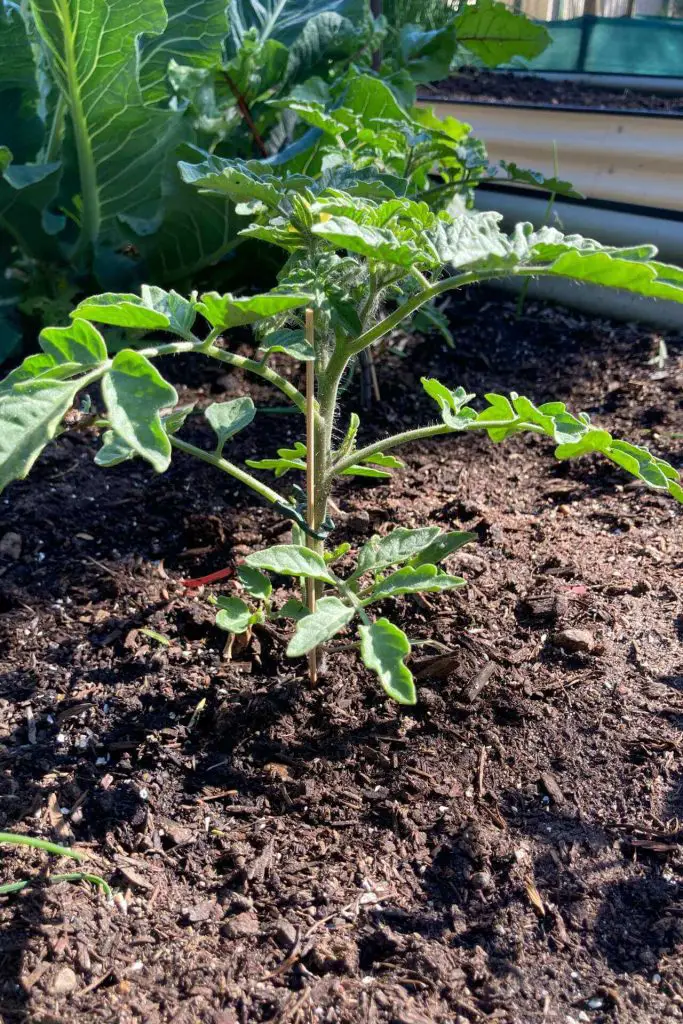
3. Tomatoes
Are you wondering can sweet potatoes be planted with tomatoes? Unfortunately, companion planting sweet potatoes and tomatoes together does not work as it increases the risk of disease for both tomatoes and sweet potatoes.
4. Pumpkins
Why? Both pumpkins and sweet potatoes like to spread out a lot, so if you plant these next to each other, they will fight for space and nutrients.
5. Gourds
Why? Both gourds and sweet potatoes like to spread out a lot, so if you plant these next to each other, they will fight for space and nutrients.
Related posts
- 17 Companion Plants For Kale & What To Avoid!
- 35 Companion Plants For Chard: Your Complete Guide For 2023!
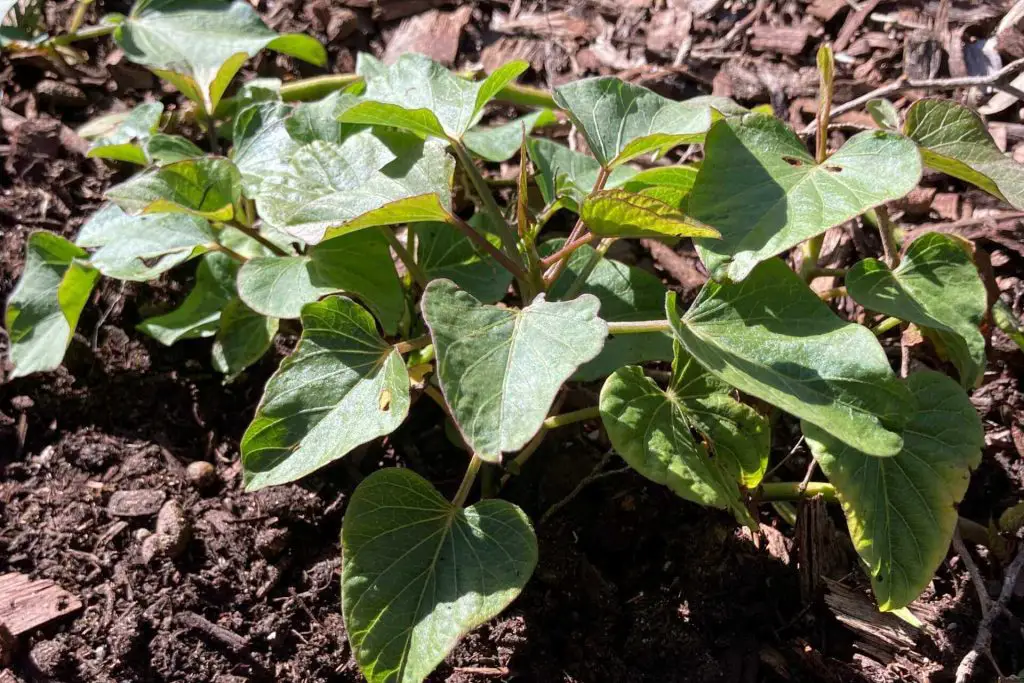
FAQs On Companion Plants For Sweet Potatoes
What Are Some Sweet Potato Planting And Growing Tips?
Wondering what are some sweet potato planting and growing tips? Sweet potatoes are a great crop for the home gardener. They love a sunny position with sandy (approximately 53% sand, 43% silt, and 7% clay), well-draining soil, and they prefer warmer temperatures to really thrive (above 75 F).
Make sure you do not soak the soil when watering, as sweet potatoes can rot in damp conditions.
They should be planted 18 inches apart from each other and will be ready to harvest in 90 to 170 days. Plant the slips in late spring or early summer, when the soil is warm, and they should be ready in Fall.
Once harvested, cure them in a warm, well-ventilated place for two weeks before storing them at room temperature.
What Should Not Be Planted Near Sweet Potatoes?
Curious about what should not be planted near sweet potatoes? There are several plants that should not be planted next to sweet potatoes for various reasons. These are:
1. Squash
2. Sunflowers
3. Tomatoes
4. Pumpkins
5. Gourds
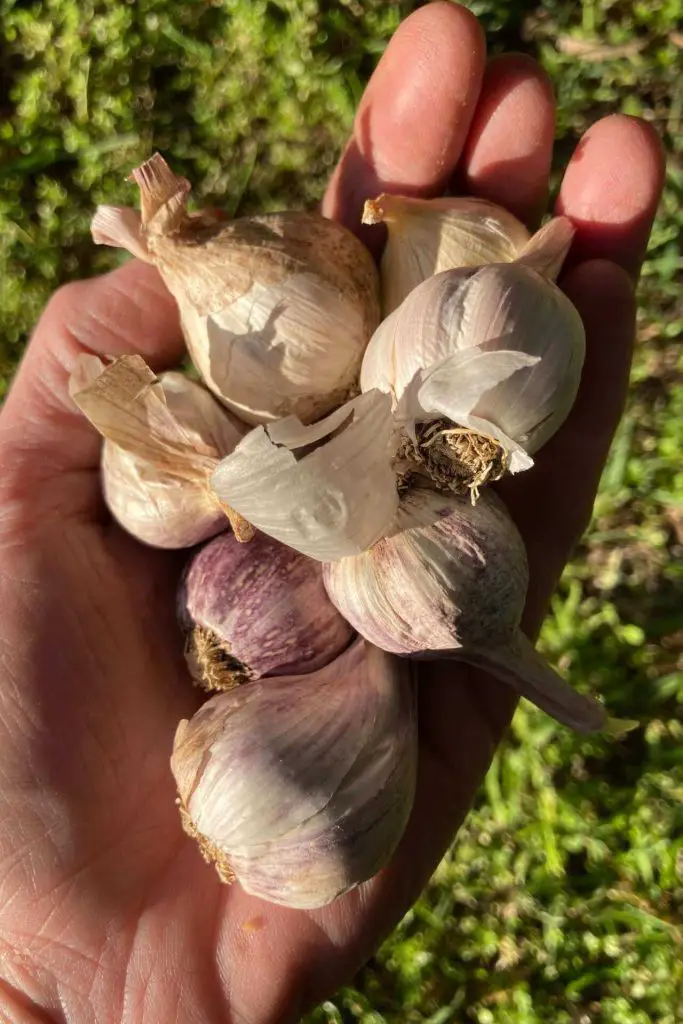
What Can I Intercrop With Sweet Potatoes?
So, what can I intercrop with sweet potatoes? If you are wondering what to plant after sweet potatoes, the best plants are to intercrop with sweet potatoes are:
1. Parsnips
2. Beets
3. Bush Beans
4. Pole Beans
5. Potatoes
6. Thyme
7. Oregano
8. Dill
9. Summer Savory
10. Spinach
11. Garlic
12. Turnips
13. Peas
14. Basil
15. Sweet Alyssum
16. Yarrow
17. Nasturtium
18. Marigold
19. Onion
20. Chives
21. Radishes
22. Horseradish
23. Corn
24. Borage
25. Lettuce
Can I Plant Onions And Sweet Potatoes Together?
So, can I plant onions and sweet potatoes together? If you wondering what companion plants for sweet potato vine there are, you’ll be pleased to know that any plants from the Allium family, which includes garlic, onion and chives, make great companion plants for sweet potatoes.
Can Peppers And Sweet Potatoes Be Planted Together?
Can peppers and sweet potatoes be planted together? Yes, peppers and sweet potatoes can be planted together! This is because the sweet potatoes act as a ground cover, keeping weeds at bay, while the peppers grow upwards and as they get bigger will provide shade for the sweet potatoes, providing the dappled sunlight that they thrive in.
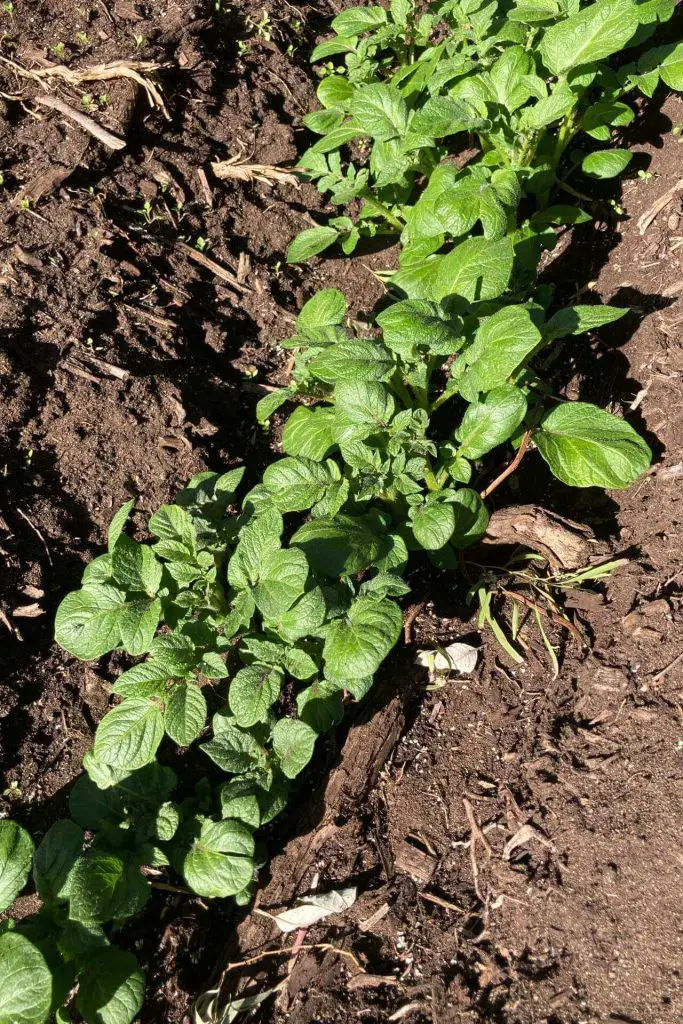
There are many reasons to grow companion plants for sweet potatoes. Sweet potatoes are a nutritious and delicious addition to any diet, (do we need to talk again about how much I love eating them?!) and they are easy to grow.
Companion plants can help protect sweet potatoes from pests and diseases, and they can also improve the flavor of the potatoes, which makes it a no-brainer.
In addition, companion plants can help to keep the soil moist and improve the drainage of the soil. Companion plants can also provide shade and shelter for sweet potatoes, and they can help to keep the soil warm during the cold weather months.
If I haven’t convinced you yet to try growing sweet potatoes and using companion plants for sweet potatoes to help improve their growth, drop me an email and let me know what is holding you back!
Related Posts

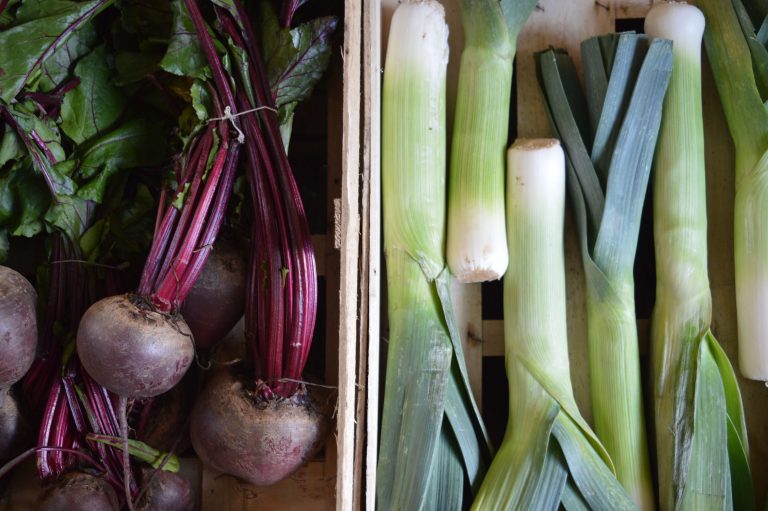
![How To Pick Mint Leaves Without Killing Plant -Exact Steps! [2023]](https://aboveandbeyondgardening.com/wp-content/uploads/2022/10/how-to-pick-mint-leaves-without-killing-plant-768x512.jpg)
![How To Grow Tomatoes Without A Garden + Unique Growing Tips! [2022]](https://aboveandbeyondgardening.com/wp-content/uploads/2022/08/how-to-grow-tomatoes-without-a-garden-7-1-768x512.jpg)
![How To Grow Tomatoes In Rainy Season + Growing Tips! [2022]](https://aboveandbeyondgardening.com/wp-content/uploads/2022/08/how-to-grow-tomatoes-in-rainy-season-768x512.jpg)
![Why Are The Leaves On My Plant Curling?[And How To Fix It!]](https://aboveandbeyondgardening.com/wp-content/uploads/2021/10/Why-are-the-leaves-on-my-plant-curling-768x502.jpg)
![Why Is My Bamboo Turning Yellow? [And How To Fix It!]](https://aboveandbeyondgardening.com/wp-content/uploads/2021/10/Why-Is-My-Bamboo-Turning-Yellow-768x512.jpg)